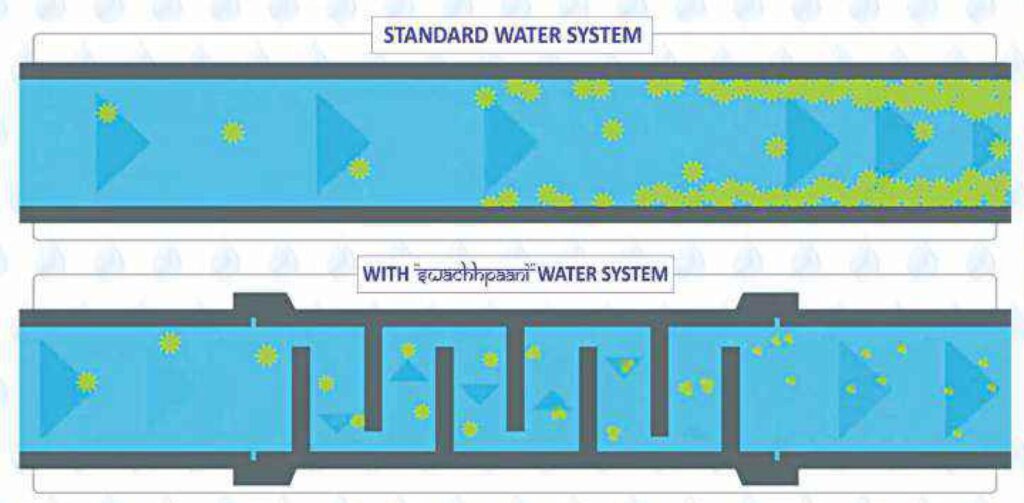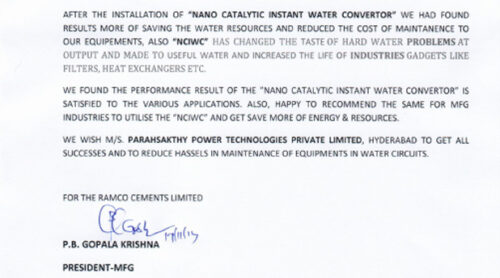Enhancing Water Treatment with Instant Solvent Softener (ISS) Technology

Water hardness, a well-known issue caused by the presence of dissolved minerals like calcium and magnesium, can lead to various problems across domestic, commercial, and industrial applications. Hard water results in scale formation, reduced equipment efficiency, and increased maintenance costs. In the previous article “What is Water Hardness?….” we discussed the types of hardness—temporary and permanent—and explored their causes, effects, and conventional control measures. Continuing from that, this article introduces Instant Solvent Softener (ISS) technology, a cutting-edge, non-chemical solution that addresses these challenges while preserving essential minerals in the water.
ISS technology is an innovative approach designed to prevent hard water scaling without the use of chemicals, making it a sustainable and environmentally friendly solution. It offers significant benefits over traditional softening methods, which often rely on chemicals, salt, or ion exchange processes. ISS works effectively in preventing scaling and biofilm formation, ensuring efficient water usage in both domestic and industrial settings.
Understanding the Impact of Water Hardness
As outlined previously, water hardness primarily results from the presence of dissolved calcium and magnesium. These minerals form deposits on surfaces, creating scale—a hard, chalky buildup that reduces the efficiency of water-heating systems, boilers, and industrial equipment.
Temporary hardness, caused by bicarbonate minerals, is typically addressed by boiling the water, which precipitates the calcium and magnesium as carbonate deposits. On the other hand, permanent hardness, caused by sulfates and chlorides, cannot be removed by heating. Industries rely on various treatment methods like chemical softeners, reverse osmosis, and chelation to manage hardness, but these methods come with trade-offs, such as high operational costs, maintenance, and the removal of beneficial minerals.
Enter ISS Technology: A Game Changer
The Instant Solvent Softener (ISS) offers a revolutionary alternative to traditional methods. Unlike conventional water softeners that use salt or chemicals to replace hardness-causing ions, ISS employs a non-invasive, physical approach that prevents mineral deposits from adhering to surfaces. This technology converts hard minerals into harmless forms, ensuring they remain suspended in the water rather than forming scale.
How ISS Works

At the heart of ISS technology is its ability to modify the physical properties of water without altering its chemical composition. It achieves this by creating turbulence in the water flow, which breaks down water molecules and dissolved minerals into smaller particles. This process alters the natural behavior of minerals like calcium and magnesium, preventing them from crystallizing into hard scale.
The key lies in how ISS affects calcium carbonate (CaCO₃). Calcium carbonate can exist in two forms: calcite and aragonite. Calcite is the primary culprit behind scaling as it forms hard, crystalline deposits on surfaces. ISS technology, however, encourages the formation of aragonite, a softer, non-scaling form that remains suspended in water. This simple yet effective mechanism allows ISS to prevent scale formation without removing essential minerals from the water.
Advantages of ISS Over Traditional Water Softeners
While traditional softeners focus on removing calcium and magnesium through ion exchange, which can result in increased sodium levels and the loss of beneficial minerals, ISS addresses hardness without such compromises. Here are some of the key benefits:
- Non-Chemical Solution: ISS does not require any chemicals, salts, or resins. It’s a completely physical process that preserves water quality while preventing scale formation.
- Retention of Essential Minerals: Unlike conventional softeners, ISS retains calcium and magnesium, minerals that are beneficial for health. This makes ISS a great option for those who want to avoid the potential negative effects of removing these nutrients from their water supply.
- Eco-Friendly: By eliminating the need for chemicals and salt, ISS reduces the environmental impact associated with traditional softeners. It also cuts down on wastewater salinity, which can be harmful to ecosystems.
- Lower Maintenance: ISS is virtually maintenance-free. Traditional systems often require regular replenishment of salt or chemicals, but ISS needs no such inputs, reducing both time and cost for users.
- Cost-Effective: As ISS prevents scale buildup, it improves the efficiency and lifespan of water systems and equipment. Industries and households can save on energy costs and maintenance expenses, as scale deposits no longer hinder heat transfer or water flow.
- Biofilm Control: Beyond scale prevention, ISS also combats biofilm formation. Biofilms—slimy layers of bacteria and microorganisms—can clog systems and reduce water quality. ISS addresses this by applying a small electrical charge that disrupts biofilm growth, keeping systems clean and efficient.
Applications of ISS Technology
ISS has proven to be effective in various industrial and domestic applications where hard water is a concern. Its versatility makes it suitable for a wide range of sectors:
- Industrial Use: ISS technology is particularly beneficial in industries reliant on heat exchange processes, such as cooling towers, boilers, and condensers. By preventing scale buildup, ISS reduces the energy required to heat or cool water, improves equipment lifespan, and lowers operational costs.
- Domestic Use: In homes, ISS can be installed to protect household appliances like water heaters, washing machines, and dishwashers from scale buildup. It helps maintain water flow in pipes and ensures that soap and detergents work more effectively, reducing the formation of soap scum.
- Commercial Establishments: Hotels, restaurants, and laundries can benefit from ISS technology by preventing scale-related issues in kitchen appliances, water heaters, and laundry equipment. ISS not only improves operational efficiency but also enhances the quality of laundered items by allowing cleaning agents to work more effectively in soft water conditions.
- Agricultural Sector: ISS is also used in agricultural settings, particularly in irrigation systems where hard water can cause scaling in pipes and sprinklers. By preventing scale, ISS ensures that water flows smoothly, improving irrigation efficiency and crop yield.
ISS: A Sustainable Water Treatment Solution
Water treatment technologies must evolve to meet growing environmental and operational challenges. ISS technology represents a significant step forward in providing an eco-friendly, cost-effective solution to water hardness and scaling issues.
Whereas traditional methods like water softening and reverse osmosis remove essential minerals and introduce chemicals or salts into the water, ISS offers a holistic approach that preserves the beneficial properties of water while eliminating the negative effects of hard water. It does so without requiring any ongoing maintenance, chemicals, or complex setups, making it a highly sustainable choice for industries, commercial operations, and households alike.
Customer Testimonial:

Conclusion
Water hardness is a widespread issue with far-reaching impacts on industries, households, and the environment. While conventional water softeners have been the go-to solution for many years, their reliance on chemicals and salt, along with the removal of essential minerals, makes them less than ideal for those seeking more sustainable options. The Instant Solvent Softener (ISS) provides an innovative, non-chemical alternative that prevents scale formation and biofilm buildup, all while preserving the mineral content of the water. With its wide range of applications and numerous advantages, ISS technology is poised to transform how we manage water hardness and protect our water systems for years to come.
By incorporating ISS into water treatment strategies, industries and households can enjoy the benefits of soft water without compromising water quality, health, or the environment.

